The e-learning market is currently experiencing substantial growth and displaying no indications of deceleration.
Content providers currently have a valuable opportunity to develop and promote online courses as a result of the shift from traditional in-person classes to digital platforms, as well as the increased availability of expert knowledge across multiple sectors.

Creators who want to share their passions online have many options available to them. One popular choice is Teachable, a platform that allows creators to sell online courses and coaching.
This article offers an analysis of Teachable for course developers and online creators, providing information on the pros and cons, as well as nine alternative platforms to help you sell your work.
1. Thinkific
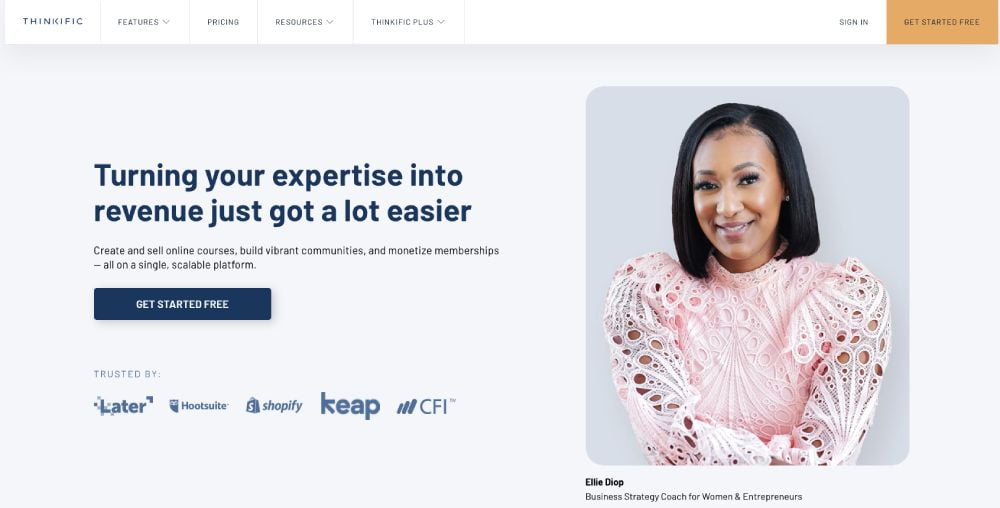
If you’re looking for a great alternative to Teachable for online course creation and memberships, consider Thinkific.
Thinkific is a competitor to Teachable that offers a free plan and various features such as a drag-and-drop site builder, customization tools, and voice-over presentation capabilities.
Thinkific allows for more flexibility with your branding by allowing you to remove their branding in important areas such as your login, sales pages, and URLs.
Pros
- The plan offers free access to high-quality course creation tools.
- The pricing options include one-time fees, monthly subscriptions, or additional course charges.
- There are no transaction fees.
- The website is compatible with mobile devices.
- Payouts are processed instantly.
Cons
- There are currently no available analytics tools for measuring course performance.
- Customer support can be reached through email only.
- The software does not include any email automation tools.
- There is a limited amount of video content available.
- There are limited options for customization.
Pricing
- Free: There is no cost for an unlimited number of students and quizzes.
- Basic: The pricing options are $49/month or $39/month (billed annually) and include unlimited students and courses, drip scheduling, and email integrations.
- Pro: There are pricing options available for $99/month or $79/month (billed annually), which include advanced pricing options, memberships, bundles, and certificates.
- Premier: The pricing options are $499/month or $399/month (billed annually) and include an onboarding package, group analysis, and unlimited growth package.
2. Kajabi
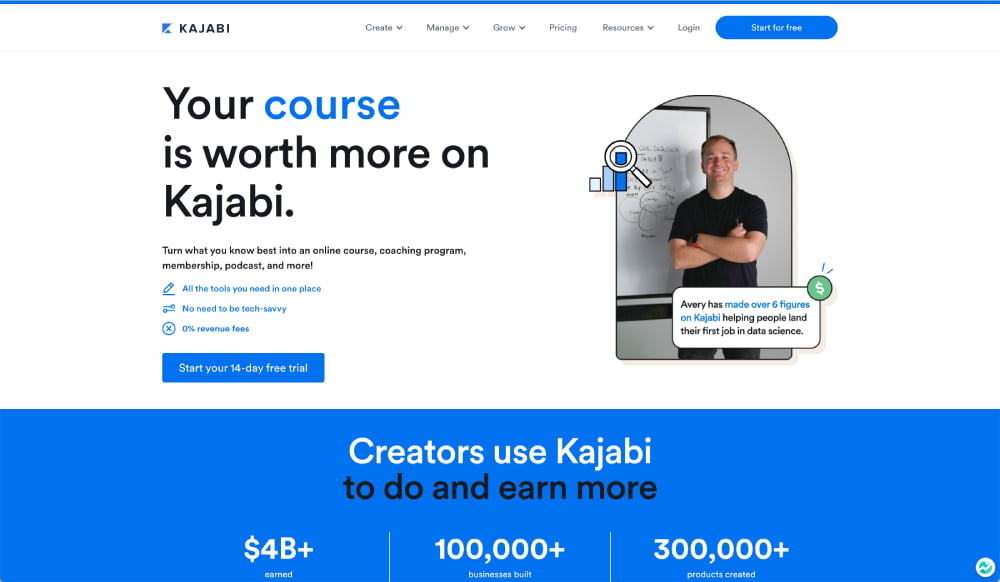
Kajabi offers course content creation tools and a digital marketing arsenal that is superior to many other platforms in this review, making it one of the top Teachable alternatives.
Kajabi offers features such as drip-feeds for membership content and a countdown timer for course releases, which can help optimize conversion and retention rates.
In contrast to Teachable, Kajabi offers the option to replace their branding with your own.
However, they come with a premium price tag.
Pros
- The platform includes email and marketing automation features.
- There are no transaction fees.
- The analytics are provided in real-time.
- The platform offers unlimited landing pages and marketing emails.
- A mobile application.
Cons
- The Basic Plan offers Kajabi branding services.
- No white-labeling or affiliate program without the Kajabi Growth Plan upgrade.
- To access a code editor for customization, upgrading to Kajabi’s Pro Plan is necessary.
Pricing
- Basic: The pricing options are $149 per month or $119 per month if billed annually. These options include a landing page builder, unlimited marketing email, and the ability to manage up to 10,000 contacts.
- Growth: The pricing options are $199 per month or $159 per month when billed annually. These options include 10 user admins, 25,000 contacts, quizzes, and surveys.
- Pro: The pricing options are $399 per month or $319 per month (billed annually) and include features such as 25 admins, advanced automation, and white labeling.
3. LearnWorlds
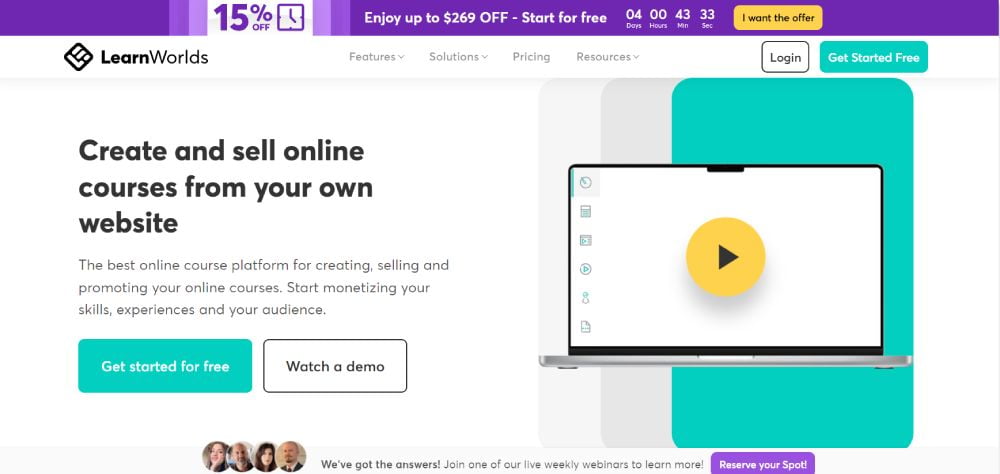
LearnWorlds is effective in helping you create and manage a thriving student community, surpassing Teachable in community building.
The social media management features of this platform, such as profile pages, private groups, likes, and comments, contribute to increased retention rates and productive discussions.
However, LearnWorlds does not offer email automation features. However, it is possible to integrate third-party email automation apps such as MailerLite or Zapier.
Pros
- Course-centric and marketing tools, such as memberships, native certifications, and coupons, are available.
- There is a wide range of community-building tools available, including quizzes and discussion forums.
- There is no restriction on the number of courses.
Cons
- The majority of advanced features are only available with higher plans.
- The software does not have an email automation feature.
- 24/7 support is exclusively offered to subscribers at a higher tier.
Pricing
- Starter: The monthly subscription fee is $29 or $24 (billed annually) for unlimited courses, custom domain, and drip courses.
- Pro Trainer: The monthly fee is $99, or $79 if billed annually. There are no transaction fees, and the plan includes five admins/instructors and the option for custom course completion certificates.
- Learning Center: The pricing options for this service are $299 per month or $249 per month when billed annually. These options include features such as 20 admins/instructors, interactive video course content, and affiliate management.
4. Mighty Networks
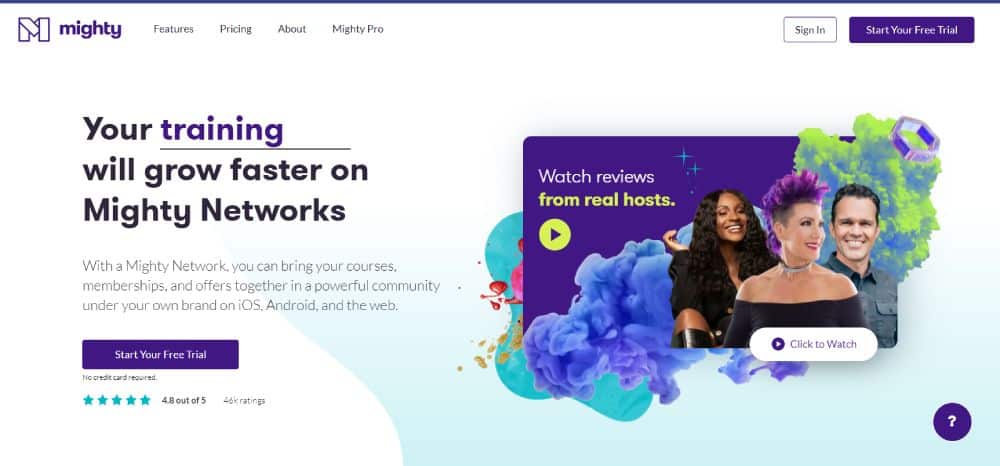
Mighty Networks is a platform designed for networking and sharing within a community.
The online course hosting feature allows users to publish courses, host events, and create a community of students.
Learners have the option to form study groups, and teams have the ability to reorganize courses into individual sections.
The platform provides tools for managing teams collectively and individually, including access to training content based on membership levels and features for broadcasting posts and updates across the network.
Pros
- Membership sites offer community-building features.
- Marketing tools, such as coupons, upselling, and cross-selling, are commonly used strategies.
- Affiliate marketing is a type of marketing strategy.
- White-labeling is a common practice in business.
- High-quality analytics tools.
Cons
- There is no integration with PayPal.
- The platform does not include features for student tracking, such as quizzes and assignments.
- There is no option available for gradually releasing content.
- There are no native integrations available for platforms like GetResponse or MailerLite.
Pricing
- Free Plan: The cost is free and includes a personalized feed, public/private tutoring options, and direct messaging.
- Business Plan: The online courses offer two pricing options: $98 per month or $81 per month when billed annually. These courses include native video, over 3000 Zapier integrations, and premium analytics.
- Community Plan: The pricing options for this service are $28 per month or $23 per month when billed annually. These options include features such as a custom domain, unlimited moderators, and the ability to charge for membership.
5. Podia
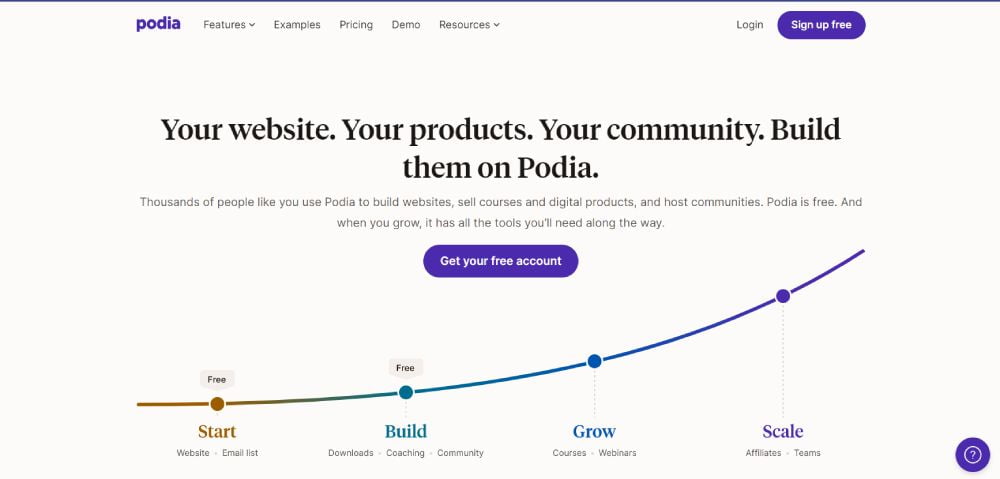
Podia successfully combines a simple design with high performance.
It offers a wide range of tools for creating online courses, selling digital products, and managing memberships on a user-friendly interface.
Podia offers excellent white-label features that allow for individual branding, unlike the Teachable platform.
Furthermore, it provides efficient email marketing tools such as email broadcasting and drip campaigns.
When making design decisions, it is necessary to weigh the pros and cons of design flexibility and the potential absence of certain features, like Teachable’s Power Editor.
Pros
- The user interface is clean and simple.
- There are no transaction fees.
- There are platforms available specifically for selling courses, memberships, and digital downloads.
- There are effective email marketing tools available, such as drip campaigns.
- The payout is processed immediately.
Cons
- There are no certificates of completion or course compliance.
- The entry-level plan does not include several powerful marketing tools.
- There are limited options for customization.
- A basic text editor is available.
- There are no built-in analytics.
Pricing
- Mover: The pricing options for the service include $39/month or $32.50/month (billed annually), and offer features such as a custom website, webinars, email marketing capabilities, and affiliate marketing tools.
- Shaker: The monthly cost is $79 or $65.20 when billed annually, and includes messaging, daily live Q&A sessions, free migrations, and third-party codes.
6. Ruzuku
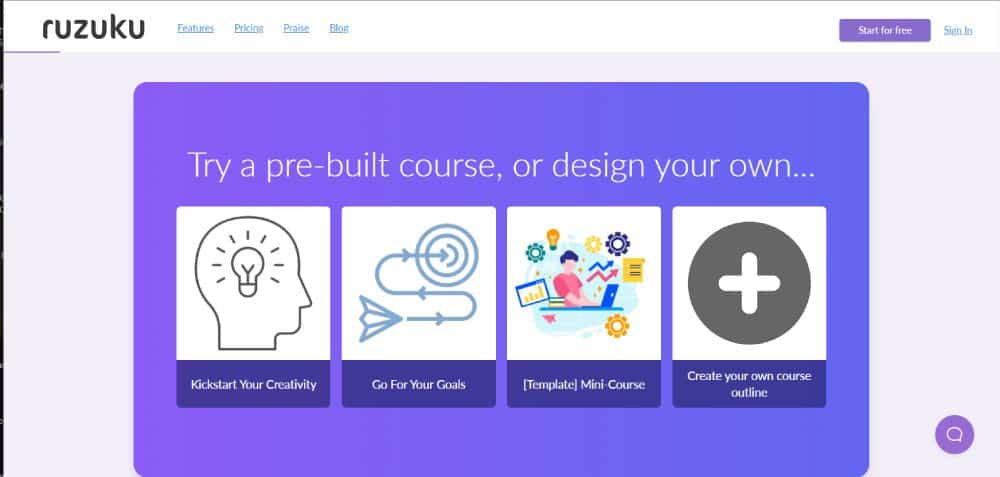
Ruzuku offers a simple online course creation process. According to customer feedback, it typically takes just a few hours to set up an online course and start enrolling students on the platform.
The platform provides features such as flexible course pricing systems, advanced course analytics, and student engagement features like webinars and video conference calls that contribute to successful releases.
Additionally, courses can be duplicated and various content delivery methods can be tested through split testing.
Pros
- The platform supports various types of content, including video, audio, and slides.
- Analytics tools are used to track students individually and collectively.
- Affiliate marketing, discounts coupons, and other promotional tools are commonly used in marketing strategies.
- There are no transaction fees.
Cons
- The platform is compatible with both PayPal and Swift as payment processors.
- Customer support can only be reached through email.
- The design customization options have some limitations.
Pricing
- Bootstrapper: The monthly subscription for unlimited courses, students, video, audio, and data hosting, as well as coupon codes, is $99. Alternatively, you can choose the annual billing option of $74.75 per month.
- Up-and-Comer: There are two pricing options available: $149 per month or $83.08 per month billed annually. These options include features such as polls/quizzes, flexible payment plans, and unlimited webinars.
- University: The pricing options are $199/month or $125/month (when billed annually) and include features such as a custom domain, multiple instructors, and multiple site managers.
7. Teachery
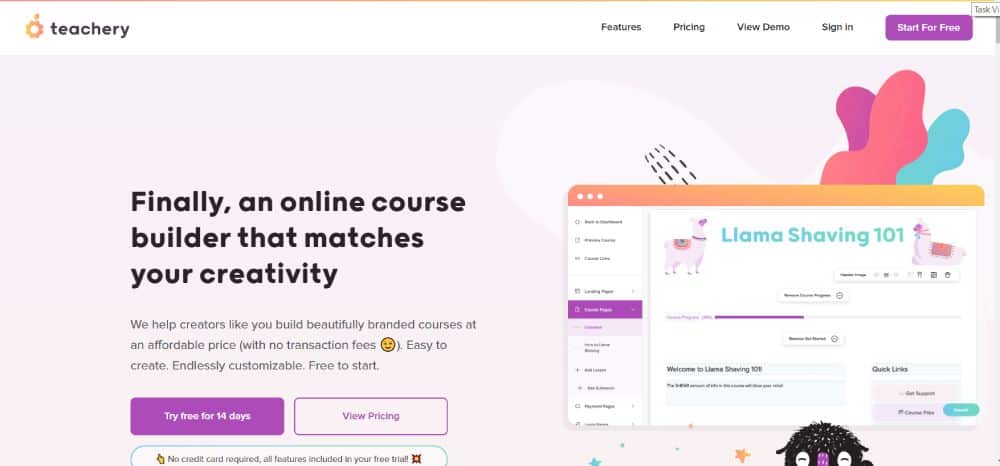
If you are looking for a platform that focuses on providing standard tools for creating courses without an excess of design features, Teachery is a good option to consider.
Teachery has a user-friendly learning curve, and its intuitive course builder allows for the creation of professional-looking courses efficiently.
Teachery provides access to a collection of marketing tools at a fraction of the cost of platforms like Kajabi.
The Monthly plan offers various features, including custom domains, unlimited landing pages and sales pages, an affiliate program, email integrations, and promo/discount codes.
If custom course compliance and certificates are important to you, it may be necessary to explore alternative options.
Pros
- There are no transaction fees.
- There are no limitations on the number of courses or students.
- There are no limits to the number of landing pages.
- An affiliate program is available.
Cons
- The platform lacks integration with video hosting services.
- The platform does not have course-centric features such as certifications, course compliance, and quizzes.
- The email integrations available are limited to Mailchimp and ConvertKit.
- There are limited design and customization options available.
Pricing
- Monthly: $49/month
- Yearly: $470/year (save 20%)
8. Udemy

Udemy is distinct from the other alternatives on this list, as it functions as an online course marketplace rather than an online course platform. This distinction allows for free use of the platform for course creation.
Udemy is a great option for course creators who don’t have an established audience. Additionally, there is no cost to use advanced online course creation resources such as the ‘Instructor Dashboard’ and a wide range of tutorials.
Once you have published your online course on Udemy’s marketplace, you can utilize various marketing tools to promote it.
You have the option to repeat successful courses multiple times without any additional cost.
However, revenue sharing with Udemy is required, with 3% of sales from your personal marketing efforts (like distributing coupons) or up to 50% of sales from Udemy’s organic traffic being allocated to them.
Pros
- There is no requirement for a specific audience.
- There are quizzes and practice tests available.
- Completion certificates.
- Teachers have a supportive community.
Cons
- To encourage students to purchase your courses directly from you rather than through Udemy, additional marketing efforts will be necessary.
- Udemy frequently offers sitewide sales where courses are discounted, resulting in significant savings on course prices.
- Udemy does not offer white labeling for its branding.
- As a course creator, you can expect to encounter strong competition.
Pricing
- Free: There is a 3% transaction fee for courses sold through marketing and a 50% transaction fee for courses sold organically through Udemy (with unlimited courses).
- Business Team Plan: The cost is $360 per person per year for teams with 5-20 members, with unlimited access to 5,500 courses and white-label dashboards.
- Business Enterprise Plan: Please contact Udemy for information on pricing plans for teams with 21+ members, customized learning paths, and custom categories.
9. Xperiencify

Xperiencify is an innovative platform that utilizes 7 psychological triggers to enhance online course completion rates.
It is considered one of the top Teachable alternatives because it provides various strategies to engage your students.
Content release schedules can be set up to generate curiosity, countdown times can create a sense of urgency, and a live leaderboard can encourage healthy competition.
The monitoring and follow-up tools help students feel connected and engaged.
Pros
- There are 7 different types of course launching plans available.
- Gamification is the use of game elements in non-game contexts.
- Students can earn experience points, also known as “XPs.”
- Course creators have the ability to design their own “key milestones.”
- There will be no charge until you are ready to publish your course.
- A generator for course names.
Pricing
All plans offer unlimited unpublished courses, while the number of courses you can publish varies depending on the plan.
- Starter Plan: The monthly cost is $49 and includes features such as a membership site and 3 published courses.
- Growth Plan: The monthly price is $99 and includes features such as cart abandonment, custom domain, and 10 published courses.
- Pro Plan: The monthly cost is $149 and includes features such as live group coaching, affiliate management, and 20 published courses.
- Platinum Plan: The price is $499 per month and includes unlimited custom fields, a dedicated customer success manager, and 50 published courses.
Bonus: Additional Alternatives


Academy of Mine
LearnDash
Skilljar
The Bottom Line
When considering Teachable alternatives, it is important to note that they have similar costs and provide excellent learning opportunities.
If you’re struggling to decide on the best Teachable alternative for your course creation goals, you have the option to try out any virtual classroom with a complimentary trial.
After considering the best alternatives to Teachable, it is crucial to make a prompt decision in order to prevent any potential delay for your students.





